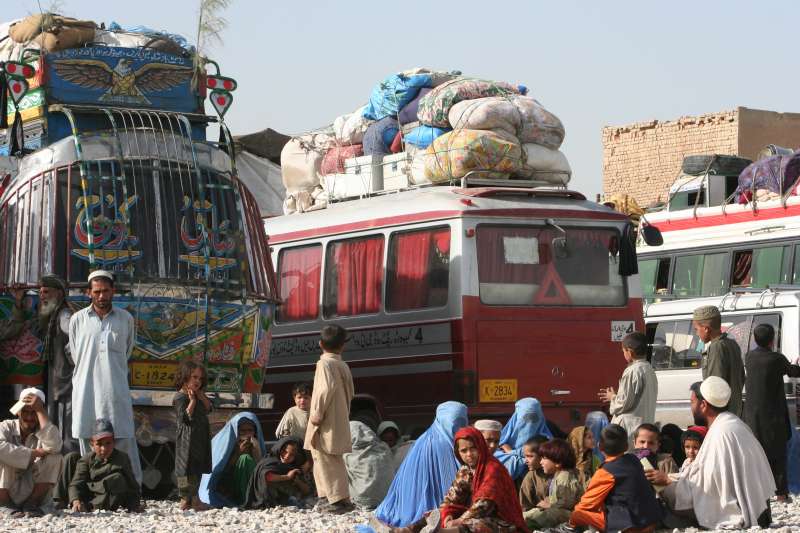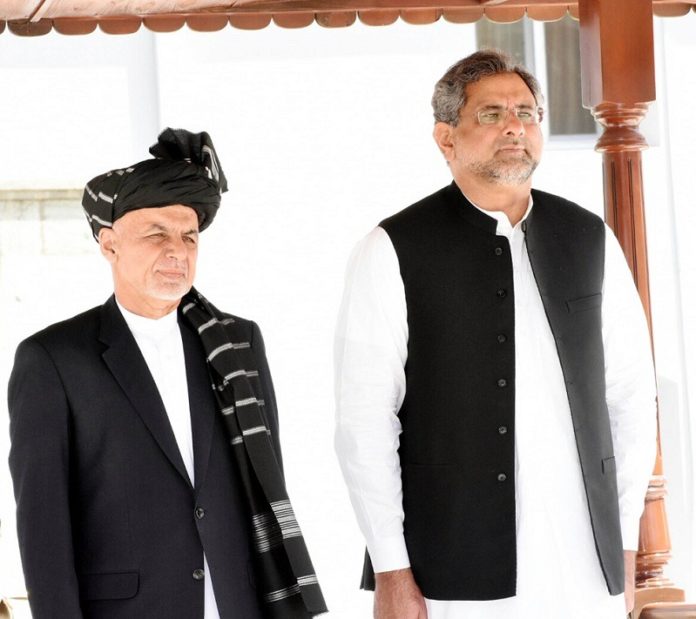Prime Minister Khaqan Abbasi’s ‘private’ visit to the United States and “official visit” to Afghanistan have, apparently, resulted in some forward movement towards achieving peace in Afghanistan. Pakistan and the US have agreed to increase contacts for the resolution of all issues especially Afghanistan. Reportedly, the US authorities have assured Pakistan that the Trump administration will continue dialogue on all issues and all its reservations will be addressed in an amiable manner. The officials level meetings have begun for follow work. Discussions would include cooperation in eradicating terrorism and assistance in Afghan reconciliation process.
During Prime Minister’s visit to Kabul on 06 April, 2018, Pakistan and Afghanistan agreed on following key principles to operationalize the working groups under Afghanistan Pakistan Action Plan for Peace and Solidarity (APAPPS) Pakistan to support the Afghan-led and Afghan-owned peace and reconciliation; the two countries to undertake effective action against fugitives and irreconcilable elements posing security threats to either country; both sides committed to deny use of their respective territory by any country, network, group or individuals for anti-state activities against either country; to put in place a joint supervision, coordination and confirmation mechanism through Liaison Officers (LOs) for realization of the agreed actions; the two countries agreed to avoid territorial and aerial violations of each other’s territory; both parties resolved to avoid public blame game and instead use APAPPS cooperation mechanisms to respond to mutual issues of contention and concerns; and to expeditiously establish requisite ‘Working Groups’ and necessary cooperation mechanism for full implementation of the APAPPS and all mutually reinforcing principles.
Pakistan has once again reemphasized that it has cleared the entire Pak-Afghan border region and there is no organized presence of terrorists within its territory. Nevertheless, considering the porous nature of the border and the presence of over 2 million Afghan refugees in Pakistan, sporadic occurrences could not be ruled out, and to counter this, Pakistan is determined to continue its ‘Intelligence Based Operations’.
Reportedly Pakistan has once again told the US that it will not accept any ‘do-more’ demands. Pakistan will not allow US or any other country to take action on its land and there will be no joint action either. And that if the US has proof of any terrorist safe heavens it should share it with Pakistan. The Pentagon has stated that the US has ruled out any plan to cross the international border in chasing the Taliban or any other terrorist groups who might flee to Pakistan.
Pakistan’s role is critical for Afghan peace, therefore, the US will have to adopt a balanced policy. Pakistan has all along been willing to cooperate in the Afghan reconciliation process. The missing link is an actionable trilateral strategy for which Afghan and the US governments need to formulate a framework in consultation with Pakistan.
Intra Afghan efforts to hold backdoor diplomacy had begun last year after Afghan government’s announcement to initiate talks with Taliban for restoration of reconciliation process. The effort is on to persuade the Afghan Taliban to make a formal announcement of a coordination committee. The objective is to declare a ‘safe zone’ where the parties could hold talks for peace process.
Earlier, during the Pakistani National Security Adviser’s visit to Kabul, the two sides discussed a whole range of bilateral reconciliatory measures. Both agreed to work out a coordinated policy for resumption of talks with Taliban. Officials of Pakistan, US and Afghanistan are in contact with each other for gradual resumption of talks for Afghan reconciliation process and progress may be expected soon. President Ashraf Ghani met with a Pakistani delegation and discussed the Afghan government’s peace offer to the Taliban. Moreover, the two sides also discussed the importance of regional cooperation in a campaign against crime and activities of terrorist networks. The Afghan President has also shown a deep desire to have a comprehensive plan of action with Pakistan regarding connectivity and trade enhancement, particularly in the context of CPEC and CAREC.

The Afghan government has repeatedly requested Pakistan to extend the stay of Afghan refugees, however, on the behest of India some elements of Afghan refugees have been found involved in nefarious propaganda to create unrest in the Pashtun community in Pakistan. The Afghan government should seriously do something to facilitate the return of its refugees in a dignified way. Pakistan is cognizant of the humanitarian dimension of this issue and its policy on Afghan Refugees is focused on a dignified return of Afghan brothers to their homeland. In this spirit, the Pakistan government has extended the validity of Refugee Cards until 30th June, 2018. Pakistan has once again urged donor countries and aid agencies to make efforts for the resettlement of these returnees by building houses and initiating livelihood projects in Afghanistan.
Earlier this year, Ghani had made yet another peace offer to the Taliban, however, the Taliban have not yet responded. The Taliban continue to carry out their tactical missions, latest being a suicide attack close to Ali Abad hospital and Kabul University. President Ashraf Ghani has offered recognition of the Taliban as a legitimate political group as part of a proposed political process. Ghani said a framework for peace negotiations should be created with the Taliban recognized as a legitimate group, with their own political office to handle negotiations in Kabul or another agreed location, inside Afghanistan. In addition, Taliban prisoners could be released and their names removed from international blacklists, while security arrangements could be made for Taliban agreeing to join a process of reconciliation. Former fighters and refugees could be reintegrated and provided with jobs.
The offer aimed at creating a platform for peace talks also proposes a ceasefire and alongside new elections in which the insurgents could participate, and a constitutional review to end the conflict. During the Kabul Process Conference, Ashraf said: “We are making this offer without preconditions in order to lead to a peace agreement.“ The Taliban are expected to give input to the peace-making process, the goal of which is to draw the Taliban, as an organization, to peace talks,” he added.
These comments, a month after a suicide attack in central Kabul that killed around 100 people, represented a change in tone on Ghani’s part, who has regularly called the Taliban “terrorists” and “rebels” although he has also offered to talk with parts of Taliban that accepted peace. The UN mission in Afghanistan has welcomed the offer and said it “strongly supports the vision for peace through intra-Afghan dialogue.”
Momentum for Afghan peace is also building from neighbouring countries that increasingly underscores the necessity of a stable Afghanistan. Militarily marginalized Taliban element have shown awareness of these contextual shifts and seem to be engaged with the Afghan government for their political future. Even militarily potent Taliban officials have acknowledged that they have faced pressure from friendly countries especially Pakistan to accept talks and said their recent offers to talk to the US are an effort to ward off the impression that they are obstructing peace.
However, there is no immediate response to Ghani’s offer, although one Taliban official, speaking on condition of anonymity, said it was being studied by senior Taliban leaders. In return for Ghani’s offer, the Taliban would have to recognize the Afghan government.
US Defence Secretary Mattis flew into Kabul two weeks after Afghan President unveiled a plan to open peace talks with the Taliban. Mattis said some Taliban leaders have expressed an interest in the discussions; “It may not be that the whole Taliban comes over in one fell swoop, that would be a bridge too far, but there are elements of the Taliban clearly interested in talking to the Afghan government.”
Alongside these gestures, military operation by occupation forces are on an upward trajectory. Since last year the US has stepped up its military assistance to Afghanistan security forces, especially through a sharp increase in air strikes, with the aim of breaking a stalemate with the insurgents and forcing them to the negotiating table. While the US military claims that their military strategy has hit the Taliban hard, the Taliban actually continue to control or contest much of the country and inflict severe casualties on Afghan and foreign forces. This has hit the innocent civilians very hard; there were over 10,000 non-combatant casualties during last year, mostly attributed to indiscreet US bombing. Last week Taliban once again described the Afghan government as “illegitimate” and its peace process efforts as “deceptive.”
Donald Trump is unrelenting on his sacking spree. CIA chief Mike Pompeo has succeeded Rex Tillerson. Pompeo is known for harder anti-Pakistan leanings. National security adviser HR McMaster is making way for the former US UN Ambassador to the UN, John Bolton, a foreign policy hawk. If his “fire” machine keeps the tempo, soon President Trump would be gleefully sitting atop likeminded garbage, hence, further widening the huge gap between Presidential laundry list and actionable options on Afghan crisis!





